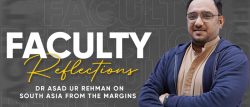On 4th September, 2020, Habib University’s Interdisciplinary Development Research and Action Center (IDRAC) held a webinar titled “Pandemic, Economic Crisis and Keynes,” to discuss the life, times and ideas of John Maynard Keynes, a 20th Century public intellectual and economist.
The webinar was moderated by Dr. Aqdas Afzal, Program Director for the Social Development and Policy Program, Habib University. The panel comprised Zachary D. Carter, author of the New York Times bestseller The Price of Peace, the book, which was central to the discussion; Dr. S. Akbar Zaidi, Executive Director of the Institute of Business Administration; and Dr. Asad Sayeed, Ph.D. in Economics, Cambridge University.
Specifically, the panelists discussed policies centered on lessening the effects of the current economic crises; the rise of rightwing authoritarianism in the world; the diminishing power of the United States of America; and on the relevance of Keynesianism to the world in this Covid-19-pandemic-induced economic crisis.
Carter’s book came about as a result of his interest in Keynes and Keynesian economics in a post-2008 financial crisis world, which brought a shift in his career from a financial reporter to an author. His transition into writing initiated an interesting discussion on the need of teaching good writing skills in colleges. Carter pointed out the enduring importance of writing even against the backdrop of the ongoing automation as a means of communicating ideas to people. Dr. Sayeed shed light on the relevance of Keynes to developing countries, which exist in disarray, owing to unstable democracy, high levels of income inequality, unregulated governance, etc. Specifically, Dr. Sayeed argued, “We [developing countries]traverse a Hobbesian world: even if we want to tax, we cannot tax, even if we want to have a formal economy, we cannot.”
Dr. S. Akbar Zaidi asserted the need for situating Keynes and his ideas in the 21st Century landscape where neoliberal globalization dominates and asked, “How does one model or think about Keynesianism which was meant for largely an autarkic system [in the present globalized world]?” Carter, however, pronounced Keynes as an “international thinker,” who believed that “National demand management strategies can help in securing international harmony by preventing countries from falling in the social pits of misery.”
The webinar was carried live on Habib University’s Facebook and YouTube pages. The panelists also answered the following question from the online audience: “If Keynes were alive today, what would his comments be on climate change?” While Carter maintained that it is “dangerous to resurrect the dead and interrogate [them],” he speculated Keynes to have called for a large-scale international cooperative effort to mobilize economies to tackle the problem of climate change.
Referring to Martin Wolf’s terming of the current economic and sociopolitical crisis in the West as the “most disturbing political phenomenon of our era” and Zachary Carter’s conjecture of the unrest being a dark time for democracy, Dr. S. Akbar Zaidi argued that the current moment of unrest and crisis has led us a phase of global, local and democratic transformation, with “a reinvention of different types of democracies”, in the making.
Habib University has always recognized the importance of dialogue and nuanced discourse around pertinent themes. IDRAC aims to foster thoughtful research and action on issues related to Pakistan and the wider South Asian context. It serves as a bridge between academic scholars, policy-makers, development practitioners, artisans and craftspeople, and the students who so eagerly study their disciplines. Habib University will continue to organize and provide a platform for discussing issues of global and local importance.




